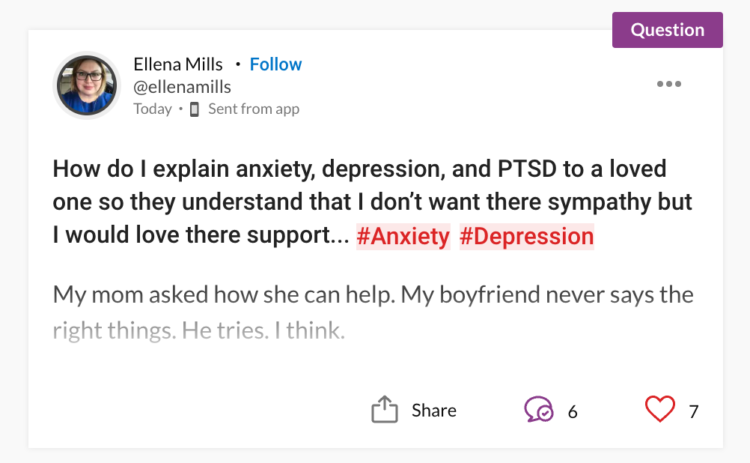I was a sophomore in high school when the feelings of depression began. I recall it happening very fast — no slow build, just a semi-truck barreling down a hill at 200 mph while I stood stuck with no chance of escape until… boom. In an instant, I wasn’t just me anymore. I became me-with-depression. And I have been ever since.
I didn’t know where to begin to understand my new feelings. Hopelessness, sadness, the constant urge to cry and/or rip my hair out. The anxiety piled on me like mulch. Where to start? I knew only one thing about this new person. There is one survival technique that accompanies all cases of depression and anxiety — the only place mental illness allows us to find clarity while navigating through our foggy brains. I knew how to lie about my illness. I knew, “I’m fine.”
I’m fine. It’s so simple, yet the most complex – and destructive – expression in the vocabulary of a person struggling with their mental health. It encourages stigma attached to poor mental health. It allows us to lie through our depression, and no one on the outside is any wiser. I’ve been lying about my manic depression and anxiety for nearly 18 years. But it was a couple of weeks ago, for the first time, that I decided not to be ashamed anymore. I made a choice not to allow my illness to continue to swallow me whole. For the first time, I decided to tell the truth.
I’d been attending school for a few weeks and had one hell of a time adjusting to the boisterous and animated instructor assigned to my class. Mr. S. was an outgoing character unafraid to face life with full vigor and positivity. He seemed to read people well. He’s the kind of person someone like me would generally steer clear of because he doesn’t shy away from alerting you of his observations. And if there is one thing a person with anxiety doesn’t like, it’s someone pointing out the “quirks” associated with their illness.
But one day when rushing into each other in passing, Mr. S. said, “You always look so sad.” I stumbled for a moment because 1) I usually avoid eye contact, but there we were and I was frozen where I stood and 2) Do I?
Questions of my very identity began swelling in my head: Is this the way everyone sees me? Am I not as opaque as I assume of myself?
I had a multitude of possible reactions to choose from. I could negate his comment with a sassy comeback or a joke about myself. I could sweep it under the rug with a nervous laugh. But for me-with-depression, my natural inclination is to lie — take the most familiar route and quietly say, “I’m fine.” But I didn’t do any of these things. Instead, I faced it head-on. I replied, “Because I am.”
People in our lives will make their comments about mental illness that may make us uncomfortable, and we can’t control that. But we can control how we react to them. Mr. S. had mentioned my shaky hands on more than one occasion. He’d asked me plenty of times if I was all right. Each time I let it slide, all while it was eating me alive with embarrassment. On this day, this was my stand. I’m not fine. It is something. I look sad because I am sad.
Send support! Answer this Mighty member’s question: 
What happened next is probably not what you are expecting. We all know why we lie to others about the state of our well-being: we are afraid to be judged, misunderstood, pitied or made to feel inferior. We don’t want to let people close to us so we choose to hide within ourselves. But perhaps, we don’t have to any longer. After responding, Mr. S. didn’t interrogate me with questions or crowd me with concerns. He let me walk away. Later, in a private setting, he admitted his own struggle with manic depression, how it affected his life and made him the man he is today. He’d been there, felt all the same hurt and confusion but was able to learn to manage it. I wasn’t alone, and he was there to offer a helping hand and the needed support for me to do the same.
By telling the truth and rejecting the familiar “I’m fine” of it all, I found common ground with an unexpected ally who understands what I’m going through. It wasn’t flashy because it didn’t have to be; it was two human beings sharing a very real, very vulnerable side of themselves and being unafraid to lay out their truths for the other to see. The very act of another person giving me the opportunity to not lie about my illness gave me a relief I’d never known. It gave me a sense of confidence and a boost of pride. It gave me courage. And, it gave me a friend.
Society’s mental illness stigma can make us believe the only choice we have when faced with the reality of our illness is to lie. The time to end the stigma is now, and that begins with telling our truths. If we’re not fine, we have to stop lying about it. It’s OK to be honest with others when you’re feeling down. You live with mental illness every day, but you do not have to live with the burden of other people not understanding it. Be honest with the world, and you may be surprised by others. Mostly, you may feel free to be honest with yourself.
Getty image by Good_Stock.

